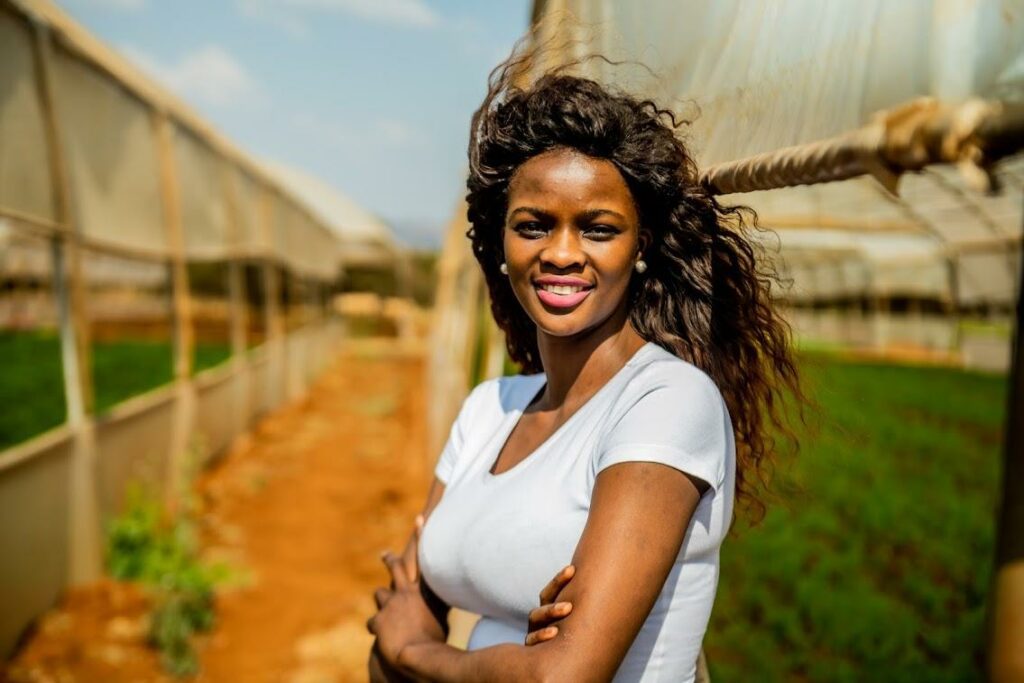Vutlhari Chauke, a young female and owner of VT Harvest, was raised in a farming environment in Limpopo. Like with many children, the hands-on experience was often met with contempt; but slowly and surely, they realise this is part of their heritage.
Vutlhari is passionate about the value of education. And it’s a passion borne out of her academic record. She obtained five distinctions in matric before studying at the Central University of Technology in the Free State. She then went on to obtain an MBA from the University of South Africa’s Graduate School of Business Leadership in 2014. Vutlhari won the Agricultural Writers SA North‘s New Entrant to Commercial Farming of the Year award in 2021. Now, she runs VT Harvest, a peri-urban farm that specialises in the production of vegetables, herbs, and high-value crops.
“In my former career, I had to phone around and find out what clients wanted. This is exactly what I’m still doing today. “I discovered that agriculture wasn’t as daunting as I thought once I just started.” Vutlhari adds that business principles are universal, with the key being to ensure that your expenses aren’t more than your income.
The Birth Of VT Harvest
“Our operation, VT Harvest of 1.5ha is based at the Tarlton AgriPark. The 200ha facility is owned by Mogale City and the infrastructure provided by Gauteng Department of Agriculture and Rural Development,”Vutlhari Chauke said. The hydroponics facility was an investment from the 2019 SAB Urban Agriculture program. Vutlhari was among the Top 9 winners. To her, this program was a game changer because it provided the infrastructure, training and technical support.
“My tomatoes, sweet peppers and fancy lettuce seeds are from Rijz Zwaan – they are the best in the market. I was introduced to them by my mentor, Johan van den Bosch. I have been growing their varieties since day one. Their seed may seem more expensive, but the end quality is unmatched,” Vuthlare explained.
Vutlhari’s VT Harvest 1,5ha area of 10 greenhouse tunnels is equipped with drip and overhead sprinkler irrigation systems. Between 10 000 and 15 000 seedlings are planted per tunnel. Even the spaces between the tunnels are planted with herbs and lettuce. She also has a small net house where she grows okra and bell peppers. The tunnels at VT Harvest are used mainly for growing tomatoes, as they have a longer growing time, and any environmental damage could lead to buyers rejecting the produce.
“The tomato crop cycle is about six to eight months. By protecting them, we’re also able to increase your yield,”explainsVutlhari.“Theherbsand lettuce take only about six weeks to grow, and even after hail they can bounce back. So it’s less of a risk to grow them outside.”
She grows the round Lindsay tomato variety of Rijk Zwaan for McDonald’s, and also an oval cocktail tomato. “The latter is the same variety which is sold in Woolworths,” she says proudly. She decided to grow the small variety for three reasons. First, it’s not a crop that thieves are interested in stealing as they target larger tomatoes. Second, there are fewer farmers competing in this space, and finally, the price per kilogram that she obtains for cocktail tomatoes is far higher than what she receives for bigger tomatoes.
VT Harvest supplies retail outlets, green grocers and restaurants on a weekly basis. They are Global Gap certified, and have been able to secure off-take agreements via Dew Crisp and Made with Rural for McDonalds and Nando’s.
No start-up comes without obstacles from time to time, and Vutlhari faced a lack of access to land, finance and mentorship; the biggest barriers to an agricultural entrant. “I have come this far mainly because my mentor has been on this journey with me from the start. He taught me how to read market trends and how to differentiate myself in the industry,” she said.
“A lesson I’ve definitely learnt from COVID-19 is that I have to spread my risk. When the restaurants were closed (due to lockdown-related restrictions), I suddenly lost a number of clients and had to find a new market for my produce.” Vutlhari believes that this has served to strengthen her business model.
“The beauty of having direct customers is the fact that I’m able to receive the best prices, and it’s also a winning cash flow strategy,” she said. She adds that it can be very limiting for a small business to deal with 30-day accounts, and her strategy frees up her capital immediately.
After every harvest, Vutlhari invests more in her farm. She is also open to listening to her clients’ needs. “Without access to the market, farming would be a waste of time and resources. The best way of knowing what a client wants is to ask them to open up their fridges to me. This is how I conduct a lot of my research. “If a particular product is found in a client’s fridge, then I know I can produce it and have a market. If five clients want to buy that product, we’re in business,” she says.
“Finally, Agro-processing is a diverse and exciting prospect – that is where my future expansion plans are geared towards. My advice to new entrants to food production is, “feel the fear and enter the space anyway.” Agriculture from the outside is seen as a tough industry, but with the right advice and support, can be extremely rewarding,” Vutlhari Chauke concluded.

